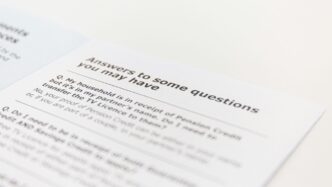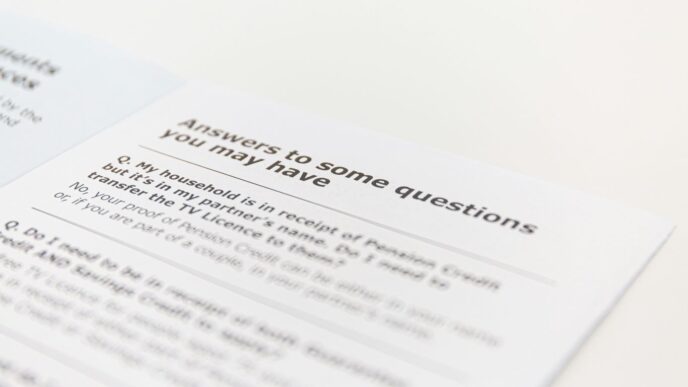Getting ready for your first job interview can feel like a lot. You know you’ll have to talk about yourself, but what exactly should you say? This guide is here to help. We’ve put together a free PDF packed with tips and examples to make your self-introduction shine, especially if you’re just starting out. Think of it as your cheat sheet for making a great first impression.
Key Takeaways
- Start your introduction by mentioning your name, your recent education, and any key skills you’ve picked up.
- Connect your academic projects, internships, or even volunteer work to the job you’re applying for.
- Showcase soft skills like teamwork and problem-solving, giving brief examples if possible.
- Practice your introduction out loud to sound natural and confident, not like you’re just reading a script.
- Avoid common mistakes like rambling, sounding arrogant, or not making eye contact with the interviewer.
Crafting Your Fresher’s Self Introduction
So, you’ve landed an interview – that’s awesome! Now comes the part where you get to introduce yourself. For freshers, this initial moment is super important. It’s your chance to make a good first impression and show them why you’re a good fit, even without tons of work history. Think of it as your mini-pitch. The goal is to give them a quick, clear snapshot of who you are and what you bring to the table.
Understanding the Purpose of a Fresher’s Introduction
Why do interviewers even ask you to introduce yourself? It’s not just to fill silence. For starters, it helps them get a feel for your personality and how you communicate. It’s also a way to break the ice and make things a bit more relaxed before diving into tougher questions. For you, it’s an opportunity to set the tone. You can highlight what makes you stand out right from the get-go. It’s your moment to steer the conversation a little towards your strengths and interests that align with the job.
Key Elements for a Compelling Fresher’s Introduction
What should you actually say? You want to hit a few key points without rambling. Here’s a breakdown:
- Your Name and Background: Start with who you are and where you’re from. A brief mention of your hometown or region can add a personal touch.
- Academic Journey: Talk about your degree, your major, and maybe a specific area of study that really interested you. Mention your university or college.
- Relevant Experiences: Since you’re a fresher, this might mean internships, volunteer work, significant college projects, or even relevant extracurricular activities. Focus on what you learned and achieved.
- Skills: Briefly touch upon a couple of key skills, both technical and soft, that are relevant to the job. Think about what you’re good at and how it applies.
- Why This Role/Company: A short sentence about why you’re excited about this specific opportunity shows you’ve done your homework and are genuinely interested.
Structuring Your Initial Interview Statement
How do you put it all together? A good structure makes it easy to follow. Try this simple flow:
- Greeting and Name: Start with a polite greeting (like ‘Good morning’) and state your name clearly.
- Academic Snapshot: Briefly mention your recent degree and institution.
- Highlight Reel: Pick one or two key experiences (like a project or internship) and what you gained from them.
- Skill Connection: Mention a relevant skill or two and how it relates to the job description.
- Enthusiasm: End with a brief, positive statement about your interest in the role or company.
Keep it concise, aiming for about 60-90 seconds. Practice it out loud so it sounds natural, not like you’re reading from a script. You want to sound confident and genuine.
Essential Components of a Job Interview Self Introduction
So, you’ve got your foot in the door for an interview, and now it’s time to introduce yourself. This isn’t just about saying your name; it’s your first real chance to make a good impression and show them why you’re the right person for the job, especially as a fresher. Think of it as your highlight reel, but for your career journey so far.
Highlighting Academic Achievements and Skills
Your education is a big part of what you bring to the table as a recent graduate. Don’t just list your degree; talk about what you learned and how it applies. Did you ace a particular subject? Work on a challenging thesis? Mentioning specific courses or academic projects that align with the job can really make you stand out. It shows you’ve been paying attention and have a solid foundation.
- GPA: If it’s strong, mention it. For example, a 3.8 GPA shows dedication.
- Relevant Coursework: List classes directly related to the role, like ‘Advanced Data Structures’ for a software job.
- Academic Projects: Briefly describe a project that demonstrates practical application of your studies. What was the goal, what did you do, and what was the outcome?
Incorporating Relevant Projects and Internships
This is where you show you’ve put your learning into practice. Internships, volunteer work, or even significant personal projects count. These experiences give you real-world examples to talk about. Instead of just saying you have ‘teamwork skills,’ describe a situation during an internship where you collaborated effectively to achieve a goal. Quantifiable results are your best friend here – think numbers and specific achievements.
- Internships: Detail your responsibilities and any positive outcomes. Did you help streamline a process? Contribute to a successful campaign?
- Personal Projects: If you built an app, designed a website, or conducted research outside of class, talk about it. What skills did you use? What did you create?
- Volunteer Experience: This can showcase initiative and a commitment to causes, often demonstrating skills like organization and communication.
Showcasing Soft Skills and Personal Attributes
Beyond your technical know-how and academic background, employers want to know what kind of person you are. Are you a good communicator? A problem-solver? Can you work well with others? These ‘soft skills’ are super important. Think about times you’ve demonstrated these qualities. Maybe you helped resolve a conflict within a study group, or you’re known for being the person who can explain complex ideas simply. Frame these attributes with brief examples to make them believable and impactful.
Tailoring Your Self Introduction Sample for Impact
So, you’ve got your basic intro down. That’s a good start, but we’re not done yet. Think of your self-introduction like a custom suit – it needs to fit the occasion perfectly. Just repeating the same thing for every interview isn’t going to cut it. You really need to make it specific to the job you’re applying for.
Aligning Your Introduction with the Job Description
This is probably the most important step. You need to actually read the job description. Seriously, read it. What skills are they looking for? What kind of experience do they mention? Your intro should directly address these points. If the job ad talks a lot about teamwork, make sure you mention a time you worked well in a team. If they need someone with strong analytical skills, highlight that. It shows you’ve done your homework and that you’re a good match. It’s like showing them you’ve got the right key for their lock.
Here’s a quick way to think about it:
- Identify Keywords: Look for repeated words or phrases in the job description. These are usually the most important.
- Match Your Experience: Think about specific examples from your studies, projects, or any past work that demonstrate these keywords.
- Weave Them In: Naturally include these keywords and examples in your introduction. Don’t just list them; tell a mini-story.
Researching Company Culture and Values
Beyond the job description, you should also get a feel for the company itself. What’s their vibe? Are they a super formal, traditional place, or more laid-back and innovative? Check out their website, their social media, and maybe even read some news articles about them. Understanding their culture helps you tailor your tone and highlight aspects of your personality that would fit in. For instance, if they emphasize collaboration, you might mention your enjoyment of group projects. If they’re all about innovation, talk about a time you came up with a new idea. This shows you’re not just looking for any job, but their job. A strong self-introduction for a job interview is a powerful communication tool. It can turn a potentially nervous beginning into a confident and engaging conversation. By highlighting your unique value, you can make a memorable first impression and set a positive tone for the rest of the interview. making a good impression.
Personalizing Your Narrative for Each Opportunity
Finally, make it yours. Don’t just recite facts. Inject a bit of your personality. What are you genuinely passionate about related to this field? What drives you? Sharing a brief, relevant anecdote or a genuine enthusiasm can make you stand out. It’s about connecting with the interviewer on a human level, not just as a list of qualifications. Remember, they’re looking for someone who will not only do the job but also be a good fit for the team. So, be yourself, but be the best, most relevant version of yourself for that specific role. It takes a little extra effort, but tailoring your intro makes a big difference.
| Aspect to Consider | How to Address It |
|---|---|
| Job Requirements | Directly mention skills and experiences listed in the job description. |
| Company Values | Align your personal values and work style with the company’s stated mission or culture. |
| Your Unique Fit | Share a brief, genuine reason for your interest in this specific role and company. |
Delivering Your Self Introduction with Confidence
So, you’ve got your introduction all planned out, right? That’s great. But how you actually say it makes a huge difference. It’s not just about the words; it’s about how you present them. Think of it like this: you can have the best recipe, but if you burn the food, nobody’s going to enjoy it.
Mastering Non-Verbal Communication
Your body talks, even when you’re not saying anything. When you walk in, stand up straight. Don’t slouch like you’re trying to disappear. A firm handshake, if offered, is good, but don’t crush their hand or give them a limp fish. During the chat, try to keep your hands relaxed, maybe resting on your lap or the chair arms. Fidgeting too much, like tapping your pen or playing with your hair, can make you seem nervous or uninterested. Using natural hand gestures can help emphasize points, but don’t go overboard – you don’t want to look like you’re conducting an orchestra. It’s all about appearing comfortable and in control.
Maintaining a Professional and Positive Tone
Your voice matters. Speak clearly and at a moderate pace. Rushing through your introduction makes it sound like you’re just trying to get it over with. On the flip side, speaking too slowly can make you seem unsure. A positive tone is key. Even if you’re a bit nervous, try to sound enthusiastic about the opportunity. Smile when it feels natural; it makes you seem approachable. Avoid complaining or sounding negative about past experiences. Frame everything in a way that shows you’re looking forward and ready to contribute.
Practicing for a Natural and Engaging Delivery
This is where the magic happens. You need to practice, but not so much that you sound like a robot reading a script. Try saying it out loud a few times. Maybe record yourself to hear how you sound. Practice in front of a mirror or with a friend. The goal is to internalize your introduction so it flows naturally. You want to sound like you’re having a conversation, not reciting lines. Being comfortable with your intro means you can focus more on listening to the interviewer and responding genuinely. Remember, they want to get to know you, so let your personality show a little. This is your chance to make a good first impression, and [14e7] is all about showing you’re the right fit.
Common Pitfalls to Avoid in Your Introduction
So, you’ve got your introduction all planned out. That’s great! But before you step into that interview room, let’s chat about a few things that can trip you up. It’s easy to get caught up in wanting to impress, but sometimes that can lead you down the wrong path. We’ll look at what not to do, so you can walk in feeling prepared and confident.
The Danger of Overconfidence
Look, confidence is good. It really is. But there’s a fine line between being self-assured and coming across as a bit of a know-it-all. As a fresher, you’re expected to be eager to learn, not to have all the answers already. When you’re introducing yourself, avoid making statements that suggest you’ve already mastered everything. Instead, focus on your enthusiasm for learning and growing within the role. Think about framing your strengths as areas where you’re keen to develop further with the company’s support. It shows humility and a genuine desire to contribute.
Ensuring Proper Appearance and Grooming
This one might seem obvious, but you’d be surprised how often it’s overlooked. How you present yourself physically speaks volumes before you even say a word. It’s not about wearing the most expensive suit; it’s about looking neat, tidy, and professional. Make sure your clothes are clean and ironed, your hair is neat, and you’ve paid attention to personal hygiene. Think of it as showing respect for the opportunity and the people you’re meeting. A little effort here goes a long way in making a positive first impression.
The Importance of Maintaining Eye Contact
When you’re talking, where should you look? Your interviewer’s eyes are usually the best place to focus. Making eye contact shows that you’re engaged, listening, and confident in what you’re saying. It helps build a connection. However, don’t stare intensely; that can be uncomfortable. Aim for a natural rhythm, looking away occasionally as you might in any normal conversation. It’s about showing you’re present and paying attention, not about trying to intimidate anyone. A good balance here is key.
Sample Self Introduction for Job Interview Fresher PDF
So, you’ve landed an interview – congrats! Now comes the part that can feel a little daunting: introducing yourself. For freshers, this is your golden ticket to making a solid first impression. It’s not just about saying your name; it’s about giving them a snapshot of who you are and why you’re a good fit. Think of it as your elevator pitch, but for a job. We’ve put together a few examples to get you started, showing you how to highlight different strengths. Remember, the best introduction is one that feels natural to you and fits the job you’re going for.
Example 1: Highlighting Communication Skills
"Good morning! Thank you for having me. My name is [Your Name], and I recently graduated with a degree in [Your Degree] from [Your University]. During my studies, I was actively involved in the debate club, where I honed my ability to articulate ideas clearly and persuasively. I also led a team project that required constant communication with different departments, which taught me a lot about keeping everyone on the same page. I’m really drawn to this role because it seems like a great place to apply my communication skills and learn more about [Industry/Field]. I’m eager to contribute to your team and grow with the company."
Example 2: Emphasizing Technical Aptitude
"Hello, thank you for this opportunity. I’m [Your Name], and I’ve just completed my Bachelor’s in [Your Degree] at [Your University]. My coursework focused heavily on [Specific Technical Area, e.g., software development, data analysis], and I particularly enjoyed building [mention a specific project, e.g., a mobile app, a data visualization tool] as part of my final year project. I’m proficient in languages like [List 2-3 relevant languages, e.g., Python, Java, C++] and have hands-on experience with tools such as [List 1-2 relevant tools, e.g., Git, SQL]. I’m excited about the technical challenges this position offers and believe my technical background aligns well with the requirements of this role."
Example 3: Showcasing Problem-Solving Abilities
"Good afternoon. It’s a pleasure to be here. I’m [Your Name], a recent graduate in [Your Degree] from [Your University]. Throughout my academic career, I’ve developed a keen interest in tackling complex problems. For instance, in a group project focused on [mention project area], we encountered an unexpected issue with [briefly describe issue]. I took the initiative to research alternative solutions, which ultimately led us to [mention the successful outcome]. I enjoy analyzing situations, finding effective solutions, and I’m always looking for ways to improve processes. I’m keen to bring this problem-solving mindset to your team and contribute to finding innovative solutions here."
Wrapping It Up
So, that’s the lowdown on introducing yourself as a fresher. It might seem like a big deal, but honestly, it’s just about being clear and showing who you are. We’ve gone over how to structure it, what to include, and even shared some examples to get you started. Remember, practice makes perfect, so say it out loud a few times before the big day. You’ve got this! Now go out there and make a great first impression.
Frequently Asked Questions
What’s a good way to start my introduction when I’m new to job interviews?
Start by saying hello, then tell them your name. After that, mention where you’re from and what you studied, like your degree and college. It’s also good to say what you’re excited about learning in the job.
How long should my introduction be?
Keep it short and sweet! Aim for about a minute. Don’t talk too long or share stuff that doesn’t matter for the job. Just give the important details.
Should I talk about my hobbies?
Yes, you can mention hobbies if they show good qualities like teamwork or creativity, or if they’re related to the job. It helps them see you as a person, not just a resume.
What if I’m really nervous?
It’s okay to be nervous! Practice your introduction a lot. Say it out loud to friends or family. The more you practice, the more natural and confident you’ll sound.
What shouldn’t I do when introducing myself?
Don’t brag or act like you know everything. Also, don’t just read from your resume or use slang words. And try not to look away too much; make eye contact.
How can I make my introduction fit the specific job?
Read the job description carefully. See what skills or qualities they’re looking for. Then, mention how your skills or experiences match what they need. Show them why you’re a good fit for *this* job.














